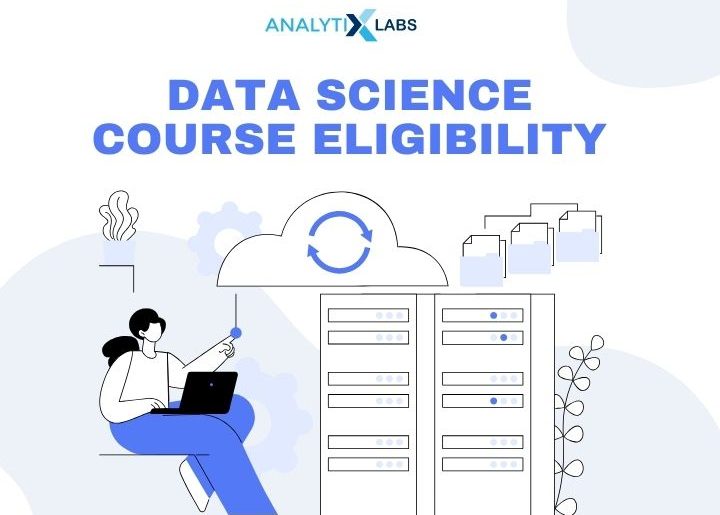Today, the world is going through a digital transformation that is impacting the operations and decision-making of businesses across the globe. A major component of this transformation is the rapid adoption of data science.
By 2025, 175 zettabytes of data will be generated globally.
Today, data science-related professions are in high demand and high-paying, offering great scope for job growth. Therefore, it is no surprise that many aspiring data science enthusiasts want to enter this field but are hesitant because they are unsure if it is for them.
This article explores the essentials for pursuing a data science career, covering eligibility, necessary skills, curriculum, and related questions like who can enroll, course subjects, duration, and fees. Let’s start by first understanding a data scientist’s responsibilities.
What does a Data Scientist do?
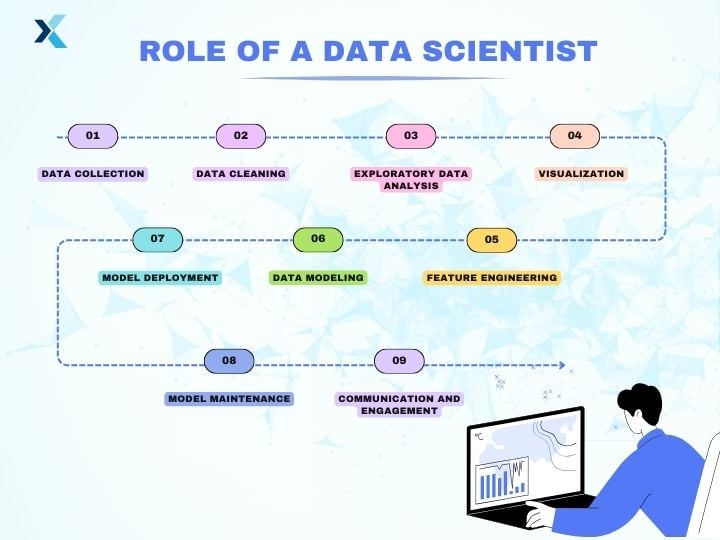
Data scientists play a crucial role in the data-driven world we live in. Companies can gain crucial insights from large volumes of data through their statistical, programming, and domain expertise.
Data scientists perform several organizational tasks, ranging from simple data exploration to developing statistical and machine-learning models. Knowledge of a data scientist’s responsibilities can also help you answer other questions, like what the subjects in data science are.
The following are some crucial things data scientists are tasked with doing.
-
Data Collection
Data scientists are responsible for understanding the data required to answer business questions. They collect data from various sources, such as databases and data lakes, using techniques such as web scraping, APIs, etc.
-
Data Cleaning
The collected data is often unclean and full of anomalies and undesired information. Data scientists, therefore, are tasked with addressing problems in the data that include missing values, outliers, and other inconsistencies.
-
Exploratory Data Analysis
Data scientists examine the cleaned data to find patterns, trends, and relationships between different features.
-
Visualization
Data scientists also perform visualization, allowing non-technical stakeholders to understand the data easily.
-
Feature Engineering
The data is typically not in the required format, so feature engineering becomes crucial. Data scientists select, extract, drop, and transform features to ensure that the data can be efficiently used by machine learning and other kinds of models.
-
Data Modeling
The core responsibility of data scientists is to develop data models such as statistical or machine learning models. All the tasks mentioned so far are typically the precursor to this step. Numerous types of models (such as regression, classification, forecasting, and segmentation) are created by data scientists to solve complex business problems.
-
Model Deployment
Data scientists can collaborate with software engineers and other IT professionals to deploy the trained model into the production environment.
-
Model Maintenance
Once the model is deployed, ensuring it doesn’t degrade over time is crucial. Data scientists are, therefore, responsible for detecting data drift, model degradation, etc., and ensuring that the model performs as expected.
-
Communication and Engagement with Stakeholders
The actionable insights gained from EDA, visualization, and model output must be effectively communicated to the leadership and key stakeholders. It allows them to make data-driven decisions and navigate the organization through the rough competition and the difficult environment in which they often operate.
If you understand what data scientists do, let’s focus on who can take a data science course, but before that –
Explore our signature Data Science and Analytics courses that cover the most important industry-relevant tools and prepare you for real-time challenges. Enroll and take a step towards transforming your career today. We also have comprehensive and industry-relevant courses in machine learning, AI engineering, and Deep Learning. Explore our wide range of courses. P.S. Check out our upcoming batches or book a free demo with us. Also, check out our exclusive enrollment offers
Data Science Qualifications
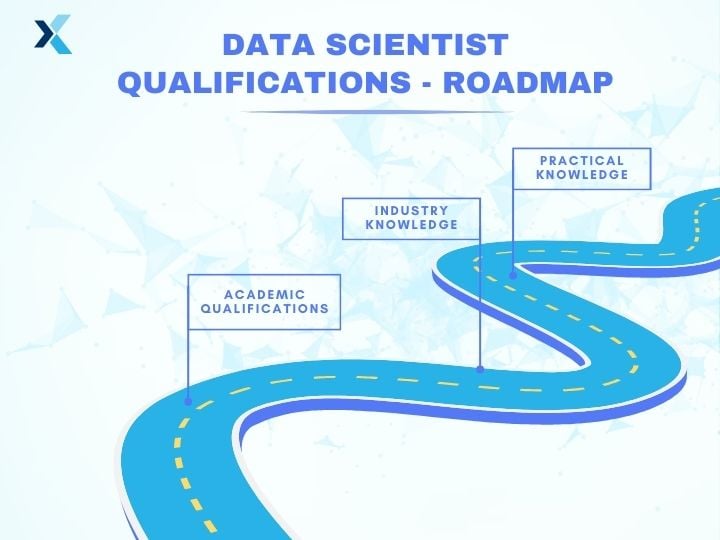
The requirements for a data science program can depend on the program’s particular curriculum, the institution’s criteria, and several other factors. However, several recommended qualifications and skillsets exist to become a data scientist. Some of the key ones are as follows.
Academic Qualifications
Data science course eligibility in India, especially for academic courses, greatly depends on academic qualifications. In the job market, the academic qualifications requirement depends on factors such as the employer, job role, desired level of expertise, etc. However, individuals from certain academic backgrounds are preferred over others.
-
Bachelor’s Degree
Almost every data science course eligibility criteria requires you to have a bachelor’s degree. It is also typically a must for any data science-related job. Most entry to mid-level data science positions require individuals who have a bachelor’s degree in fields like mathematics, statistics, computer science, economics, engineering, and even physics.
However, individuals with academic degrees such as a B.com and a BSc can also make it into the data science field, given that they have enough knowledge and relevant certifications.
-
Master’s Degree
Data science course eligibility after graduation, especially for a Ph.D. related to data science, requires you to have a relevant master’s degree. High-level positions can require individuals to have a master’s degree and can increase the job prospects for entry to mid-level job opportunities. Master’s degrees typically preferred are Masters of Science (MS) in Statistics, Mathematics, Economics, and, ofcourse, Data Science.
-
Ph.D
Data science course eligibility in India and abroad for jobs in specialized domains and academia may depend on whether you hold a Ph.D. Several high-profile job roles have required individuals to have a Ph.D. specializing in machine learning, deep learning, natural language processing, etc.
Industry Knowledge
In addition to academic qualifications, data scientists need domain expertise in industries where data science is commonly used. This involves finance, healthcare, and other related industries. Knowledge of key business processes, terminologies, and regulations is also crucial.
In addition, having sound business acumen is also essential, allowing the passing of actionable insights to the stakeholders and communication of critical findings to the leadership. Lastly, the data scientist must know market trends and the business’s landscape.
Practical knowledge
Practical knowledge is also a fundamental qualification for excelling in data science. It can be gained through assignments, projects, and real-world experience. This allows data scientists to solve real-world problems, formulate hypotheses, design experiments, and find key insights.
As the needed qualifications are out of the way, let’s focus on the key skills required to become a data scientist and excel at it.
Skills and Tools To Learn
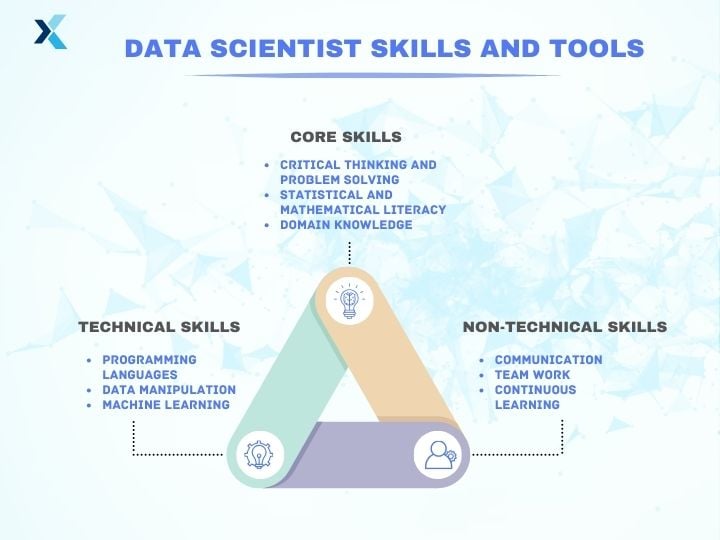
A data scientist must possess several core, technical, and non-technical skill sets.
-
Core Skills
One must have three key core skills to be a data scientist.
Critical Thinking and Problem Solving
Critical thinking and problem-solving are the first core skills that one must have. These skills allow data scientists to look at problems from different angles, evaluate alternative solutions, and iterate on solutions based on insights and feedback.
Statistical and Mathematical Literacy
Data scientists need to understand various statistical and mathematical methodologies, as they enable them to interpret results from models, draw reliable conclusions from data, etc. One must know important concepts, including regression analysis, hypothesis testing, probability theory, experimental design, calculus, and linear algebra.
Also read: Understanding the Role of Distribution in Statistics
Domain Knowledge
As mentioned earlier, domain knowledge is an important core skill for a data scientist as it enables them to contextualize their analysis and generate actionable insights.
-
Technical skills
Knowledge of programming languages, data manipulation, and machine learning form the three key technical skills.
Programming Language
Skills in programming languages like R and Python are essential as they allow data scientists to build models and manipulate and transform data. Data scientists need to know libraries like pandas, NumPy, SciPy, TensorFlow, scikit-learn, dplyr, caret, etc.
Also read: Pytorch vs. TensorFlow: Which Framework to Choose?
Data Manipulation
Data scientists need data cleaning, processing, transformation, etc., skills to convert the data into a format suitable for analysis. Knowledge of how to perform data aggregation, merging, and extraction is also important.
Machine Learning
A strong foundation around machine learning and deep learning techniques and methodologies is important for data scientists to develop models effectively. One must know the various supervised and unsupervised learning algorithms, dimensionality reduction techniques, ensemble modeling methods, model evaluation metrics, etc.
Also read: Supervised vs. Unsupervised Learning in Machine Learning
-
Non-technical Skills
One must have several non-technical skills, which are considerably important to work as a data scientist. The most important ones are as follows-
-
Communication
Data scientists are often required to communicate difficult technical concepts to non-technical stakeholders. It’s often based on how well the findings are communicated that the initiative’s success is determined. The findings of the data scientist must be presented through visualization and dashboard in a storytelling manner so that they make a compelling case for the leadership to make the decisions they recommend.
-
Teamwork
Data science is a complex domain requiring data scientists to work in interdisciplinary teams. To execute a data-based project successfully, it’s crucial to collaborate with business stakeholders, domain experts, and various IT professionals, making teamwork a vital skill.
-
Continuous Learning
Data science is a field that evolves rapidly, and new technologies, tools, and techniques are always being developed. Therefore, adaptability and the skill to continuously learn about the latest trends and advancements are necessary.
Since you now understand the qualifications and skills required to become a data scientist and excel at it, let’s discuss who should ideally become a data scientist.
Who should become a Data Scientist?
Apart from focusing on eligibility for data science courses, you should also consider whether data science suits you. Individuals with certain kinds of acumen are best suited for certain job roles; the same is true for data science.
While anyone can become a data scientist if they work hard enough and gain the necessary skillsets, certain individuals are well-suited to the field.
Typically, individuals who have good analytical skills, can solve complex problems, are capable of identifying, and are adept at deriving insights can be good at data science. If one is passionate about mathematics and statistics, one can leverage their quantitative skills to excel in data science roles.
Programming enthusiasts, particularly those good at languages like Python, R, SQL, etc., become good data scientists as these languages are heavily involved in data manipulation, model building, automation, etc. If you are good at communication and teamwork and have a curious mind, you can also become a data scientist.
Lastly, given how confidential and sensitive information a data scientist has to deal with, individuals who prioritize integrity and ethics should become data scientists, too.
If you think data science is for you, follow the section below, which discusses the steps to becoming a data scientist.
How to become a Data Scientist?
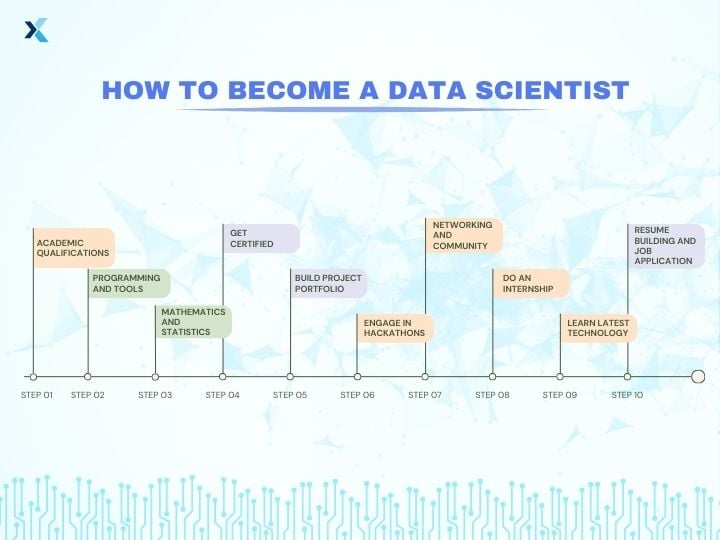
Certain steps can be taken to become a data scientist. If one follows these steps, becoming a data scientist can become relatively easy. The following step-by-step guide outlines the key steps to becoming a data scientist and can act as a data science learning guide.
-
Step 1: Obtain Academic Foundation
The first step is to gain a bachelor’s degree in relevant fields such as statistics, mathematics, computer science, economics, etc. This is important as data science course eligibility after graduation can often depend on the stream in which you completed your bachelor’s degree. You can pursue a master’s degree in data science or other fields like computer science or statistics.
-
Step 2: Gain Knowledge of Programming and Tools
The next step is to gain proficiency in tools like R, Python, and SQL and learn about their associated libraries.
-
Step 3: Acquire Statistical and Machine Learning Skills
A crucial step would be to become proficient with statistical and machine learning concepts. You will need to learn about key descriptive and inferential statistics concepts. You also need to learn how to work with key statistical, machine learning, and deep learning algorithms.
-
Step 4: Get Certified
Certificate courses in data science will help you justify your skill set. This step can be particularly important for those individuals who may not belong to the relevant academic field or have no formal education in data science.
-
Step 5: Build a Portfolio of Projects
The next key step is to implement the gained knowledge. You must engage in hands-on projects that will help you showcase and justify your expertise. Using platforms like GitHub and uploading your projects there can greatly enhance your visibility as a potential data scientist. By analyzing and building models on real-world datasets, you will better understand what it feels like to be a data scientist.
-
Step 6: Participate in Hackathons
Multiple platforms like Kaggle, DrivenData, and HackerRank allow you to participate in online competitions and solve real-world problems, collaborate with other data science aspirants and professionals, and gain recognition among your peers. This is a great way to get exposure to the real world of data science and build some confidence.
-
Step 7: Networking and Community Building
A key step that data science aspirants often overlook is networking. You should be aware of the latest advancements and opportunities in the market. To stay updated, you should join conferences, meetups, and online forums and follow the latest news related to data science through social media platforms and news portals. If possible, you should engage in forums and discussions.
-
Step 8: Internship
A crucial step is getting practical experience, which can be gained by seeking freelance or internship opportunities. Working as an intern, for instance, will provide you with exposure to industry practices. This, in turn, will allow you to interact with industry professionals and gain hands-on experience.
-
Step 9: Learning the latest technology
While the above step will make you aware of the current trends, tools, and technologies, a crucial step is to learn about the new methodologies, as data science is a fast-evolving field. You can do so by enrolling in online courses, reading research papers and blog posts, and attending workshops.
All this will ensure that your skills and knowledge base are up-to-date and even ahead of the curve when you try to enter the job market.
-
Step 10: Resume Building and Applying for Entry-Level Positions
Lastly and most importantly, once you feel you have gained enough skills, knowledge, and expertise and have the confidence to face the interviews, you should focus on building your resume and start applying for entry-level data science positions. Job positions that should be on your radar include data analysts, business analysts, junior data scientists, etc.
By following this data science learning guide, i.e., all the steps mentioned above, you can greatly enhance your chances of becoming a data scientist. However, the tricky part is knowing what to learn about data science as it’s a vast field and getting lost in it is easy. That is why, in the next section, the essential curriculum of data science is discussed.
Data Science: Curriculum
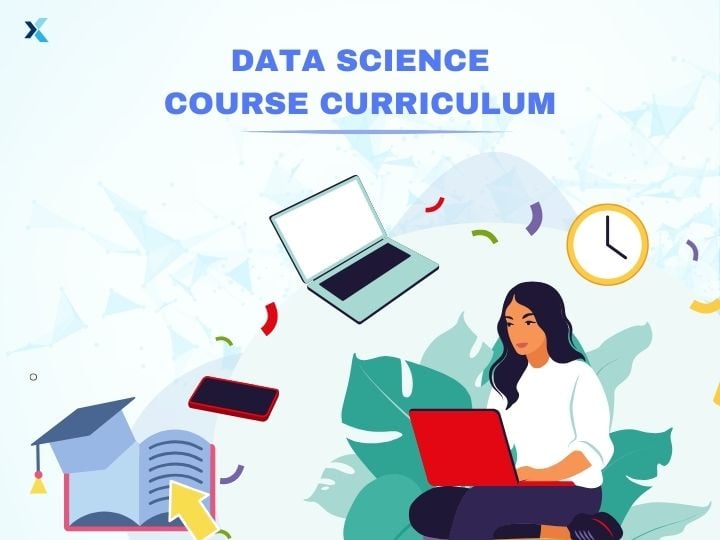
As the field of data science is vast, it is difficult to describe its curriculum and provide you with an exhaustive list of all the topics to cover. However, you must cover certain aspects of data science that form the baseline data science curriculum. The key data science concepts and areas of study are as follows.
-
Data Science Foundations
- Purpose of Data Science
- Overview of data science processes, applications, and key principles
- Understanding of Data types and Data Structures
-
Data Manipulations
- Techniques of data cleaning, transformation, and processing
- Methods of Performing Exploratory Data Analysis
- Ways to detect anomalies in the data
-
Data Visualization
- Types of graphs and ways to visualize different kinds of data
- Knowledge of key types of graphs such as histograms, line charts, bar charts, pie charts, stacked bar charts, dodged bar charts, etc.
- Univariate, bivariate, and multivariate analysis through graphs
-
Dashboarding
- Story Telling Techniques
- Data Visualization using Tableau
- Static and Interactive Charts
-
Feature Engineering
- Methods for Feature Selection and Reduction
- Filter Methods (correlation coefficient, chi-squared test, information gain)
- Wrapper Methods (forward selection, backward elimination, recursive feature elimination)
- Embedded Methods (Lasso, Ridge, Elastic Net)
- Methods for Feature Extraction
- Principal Component Analysis (PCA)
- Linear Discriminant Analysis (LDA)
- Autoencoders
-
Types of Models
- Supervised Learning Models such as regression and classification
- Unsupervised Learning Models such as clustering, anomaly detection, and dimensionality reduction
- Time Series Analysis for forecasting, trend detection, and analyzing time series data
-
Statistical Techniques
- Descriptive Statistics: Measure of Frequency, Measure of Central Tendency, Measure of Variability, Measure of Shape
- Inferential Statistics: Probability Distribution, Hypothesis Testing (z-test, t-test, f-test, chi-square), Correlation, Regression Analysis
Also read : Descriptive vs. Inferential Statistics: Definitions and Examples
-
Machine Learning Techniques
- Understanding of pre-modeling, modeling, and post-modeling steps
- Concept of underfitting, overfitting, and generalization
- Understanding model evaluation
- Different types of cross-validation
-
Algorithms
- Statistical algorithms
- Linear Regression
- Logistic Regression
- Decision Tree (Regressor and Classifier)
- ARIMAX
- Decomposition
- K-means
- Machine Learning algorithms
- Support Vector Machines (SVM)
- Naïve Bayes
- K Nearest Neighbor (KNN)
- Ensemble Methods (Bagging, Random Forest, Boosting, AdaBoost, XGBoost, Stacking, etc.)
- DBSCAN
- Deep Learning algorithms
- Artificial Neural Networks (Feed Forward Neural Networks)
- Recurrent Neural Networks
- Convolutional Neural Networks
- LSTM
-
Programming Fundamentals
- Basic Fundamentals of Python and R
- Control Flow Functions
- User Defined Functions
- Data analysis and manipulation libraries like Pandas and Dplyr
-
Natural Language Processing
- Tokenization
- Text Processing
- POS Tagging
- Sentiment Analysis
- Topic Modeling
- Word Embeddings (Word2Vec, FastText, GloVe)
-
Big Data Technologies
- Overview of Big Data (its need, challenges, key technologies, etc.)
- Basics of parallel processing, distributed systems, Map Reduce, etc.
- HDFS, Hive, Pig, HBase
- Apache Spark
-
Cloud Computing
- Cloud Architecture
- Different types of Cloud Service providers
- Infrastructure as a Service (IaaS)
- Platform as a Service (PaaS)
- Software as a Service (SaaS)
- Cloud Deployment Models (Public, Private, Hybrid, and Multicloud)
-
Domain Knowledge
- Marketing Analytics
- Social Media Analytics
- Healthcare Analytics
- Customer Segmentation
-
Business Intelligence (BI)
- Purpose and Objectives of BI
- Online Analytical Processing
- BI Tools – Tableau, Power BI, Qlik View
-
Data Warehousing
- Database Management Systems (DBMS) – relational database design, SQL queries, etc.
- NoSQL databases – MongoDB, Redis, Cassandra
- Data Pipelines – ETL, ELT processes
- Knowledge of various data collection and storage techniques
Also read: Data Warehouse Interview: Top 30 Questions and Answers
As you can see, data science is a huge domain; however, it’s worth the hard work to learn about the various aspects of this field as it’s a good career option, as discussed in the next section.
Why is data science a good career option?
Data science is a good career option for a couple of reasons. First, data scientists are in high demand due to digitization, and large volumes of data organizations are available for analysis. Second, data science provides lucrative salary packages.
In addition to all this, there are diverse career options across multiple domains, allowing individuals from different industry backgrounds to get into the field of data science. Also, given the constant innovation in the field, it provides opportunities for data science professional to learn about new techniques and excel in their field.
Lastly, given that organizations worldwide are involved in data and will generate more in the coming years, this provides data science professionals with global opportunities and ensures that it’s a future-proof career.
Next, let’s discuss the salary prospects of data science professionals in India.
Understanding the Career Graph of a Data Scientist
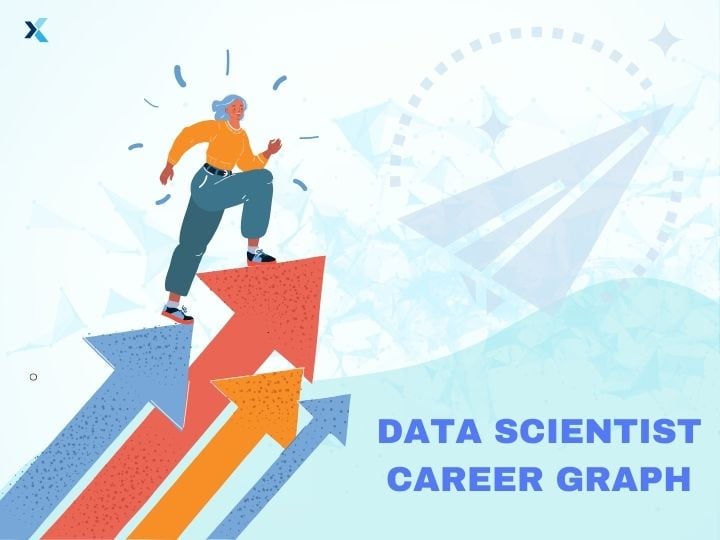
Different data scientist job roles offer different salaries due to requiring different tasks.
-
Different data science roles
The different salaries offered to data scientists at various stages of their careers can help understand their career graph.
- Data Science Intern: INR 3.7 Lakhs
- Data Scientist: INR 14.5 Lakhs
- Senior Data Scientist: INR 26.6 Lakhs
- Lead Data Scientist: INR 29.9 Lakhs
-
Related career roles to explore
There are several other job roles related to data science. These include-
- Data Analyst: INR 6.3 Lakhs
- Business Intelligence Analyst: INR 8.5 Lakhs
- Machine Learning Engineer: INR 10.2 Lakhs
- Data Engineers: INR 10.8 Lakhs
- Data Architect: INR 26.6 Lakhs
In the section below, we will explore what industries you should focus on if you decide to enter the field of data science.
Industries hiring data scientists
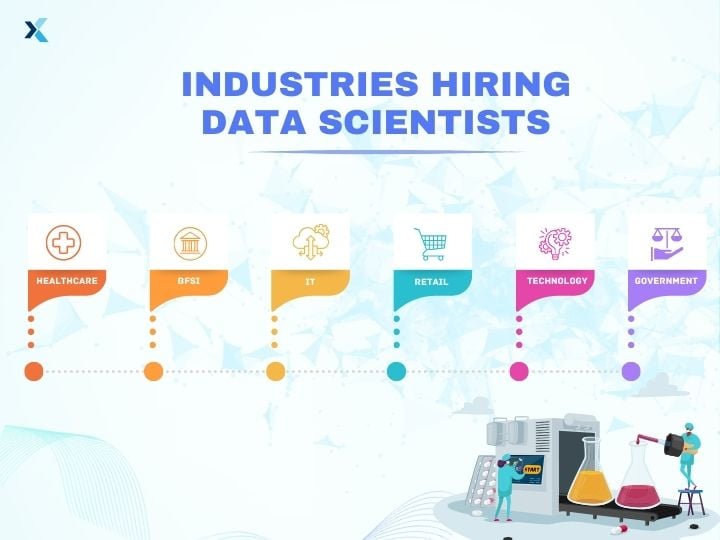
There are several industries where data science plays a crucial role as it helps them optimize operations, enhance data-driven decisions, and allow for innovation. The most prominent industries in which data scientists are commonly leveraged are as follows-
-
Healthcare
The healthcare industry deploys data science to prescribe personalized medicine, use predictive analytics to diagnose diseases and optimize resources. Hospitals, medical research institutions, pharmaceutical companies, etc., commonly hire data scientists.
-
BFSI
Banking, financial services, and insurance (BFSI) companies employ data scientists for risk management, credit scoring, fraud detection, customer segmentation, product recommendation, and algorithmic trading. Banks, insurance companies, and Fin-Tech startups are common players involved in the industry.
-
IT
Software development firms, IT consulting firms, cybersecurity companies, etc., hire data scientists for various tasks such as network and software development optimization, monitoring of IT infrastructure, etc.
-
Retail
Data scientists have a crucial role in organizations related to the retail industry, such as e-commerce platforms, marketing research firms, retail chains, etc. They optimize prices and supply chains and perform customer segmentation and demand forecasting.
-
Technology
Tech, software, social media, and gaming companies perform product, user behavior, trend, and customer experience analytics, and data scientists are required to do all this.
-
Government
Lastly, government organizations, such as agencies, research institutions, regulatory bodies, etc., involve data scientists to optimize transportation, detect regulatory violations, improve delivery of government schemes, etc.
Lastly, if you want to become a data scientist, we have outlined a few ways to learn about this field.
Where and how to start learning
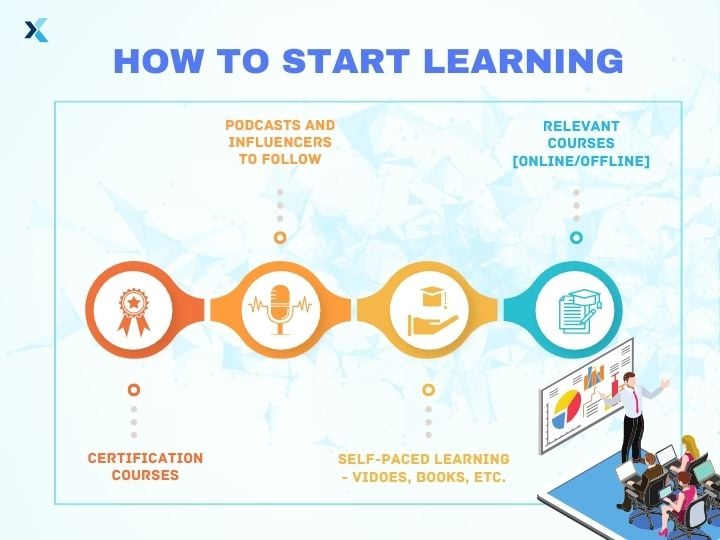
One can learn about data science in multiple ways, from certification courses to YouTube channels. You can follow some key resources to learn about the numerous aspects of data science.
-
Certification courses
Several of the best data science courses in India can be found on the following platforms-
- AnalytixLabs
- Coursera
- EdX
- Udacity
The duration and fees of a data science course can depend on the curriculum being covered and the quality of the content. Still, a course typically ranges from 1 month or 30 to 6 months or 200 hours. The cost can similarly range from a few thousand to lakhs of rupees.
-
Free podcasts and influencers to follow
There are ways to learn data science where you aren’t hindered due to data science program requirements. Here, we are referring to self-learning through podcasts and other mediums. Common data science podcasts are Data Skeptic, Linear Digression, Data Science at Home, and Data Crunch, while key publications are Towards Data Science and Springer’s Journal of Data Science.
You can find key data science influencers by following the top Kaggle data scientists’ social media accounts, such as Twitter and LinkedIn, or checking out their GitHub accounts.
-
Self-paced learning materials – books, YouTube channels
Books for self-learning data science include
- Data Science for Dummies by Lillian Pierson
- Introduction to Machine Learning with Python: A Guide for Data Scientists by Andreas C. Müller and Sarah Guido
- Python for Data Analysis by Wes McKinney
YouTube channels that you can follow to learn about data science are
- Sentdex
- 3Blue1Brown
- StatQuest with Josh Starmer
- Corey Schafer
- freeCodeCamp
-
Relevant courses to take up
The best data science courses in India that you can take to learn data science are
- Data Science 360 from AnalytixLabs
- Full Stack Applied AI Course from AnalytixLabs
- Professional Certificate in Data Science from Harvard University available at edX
- Data Science Specialization from Johns Hopkins University available at Coursera
- IBM Data Science Professional Certificate available at Coursera
- MicroMasters Program in Statistics and Data Science from MIT available at edX
- Deep Learning Specialization available at Coursera
- Machine Learning Certification by Stanford University available at Coursera
- Python for Data Science and Machine Learning Bootcamp is available at Udemy
- Data Science A-Z™: Real-Life Data Science available at Udemy
The eligibility for data science courses mentioned above is flexible; any graduate can typically opt-in.
Conclusion
Data science is a vast field, and one needs to stay curious and resilient to embark upon the journey to learn it. There are multiple ways to learn about it. It’s, however, up to you which medium of learning is most suitable for you.
FAQs
-
What are the core skills to become a data scientist?
The core skills required to become a data scientist are programming skills (R, Python, SQL), knowledge of statistics, mathematics, machine learning, big data technologies, data visualization, etc.
-
What are the common tasks a data scientist performs?
Common tasks performed by data scientists are data collection, cleaning, exploratory data analysis, feature engineering, model development, model evaluation, validation, deployment, and monitoring.
-
What are the different career prospects of a data scientist?
There are numerous career paths and job roles related to data science. These include data analysts, machine learning engineers, business intelligence analysts, research scientists, AI/ML researchers, chief data officers, and data scientists.
-
Can any graduate opt for a data science course?
Individuals from different backgrounds can opt for different courses. However, there are different data science course eligibility criteria for different courses. While some require academic qualifications in a STEM background, others can be more accommodating and flexible.
-
Is it worth being a data scientist in 2024?
It is still worth being a data scientist in 2024 because data scientists are in high demand, have lucrative salaries, and have great career growth opportunities.
-
Can I study data science after 10th standard?
While you cannot formally study data science after the 10th, you can focus on mathematics, statistics, and programming languages like Python, participate in online competitions, and ensure that you continue your education.
-
Can I study data science after the 12th?
You can start studying data science after 12th grade by choosing a bachelor’s degree program, preferably in the STEM field, taking data science-related electives, becoming an intern in a related role, building a portfolio of projects, and supplementing your formal education with online courses related to data science. Eventually, you can do your master’s in data science or a related field.
We hope this article helped inform you of the different data science course eligibility criteria and ways to become a data scientist. If you want to enroll in a data science course, contact AnalytixLabs to learn more about our courses.

